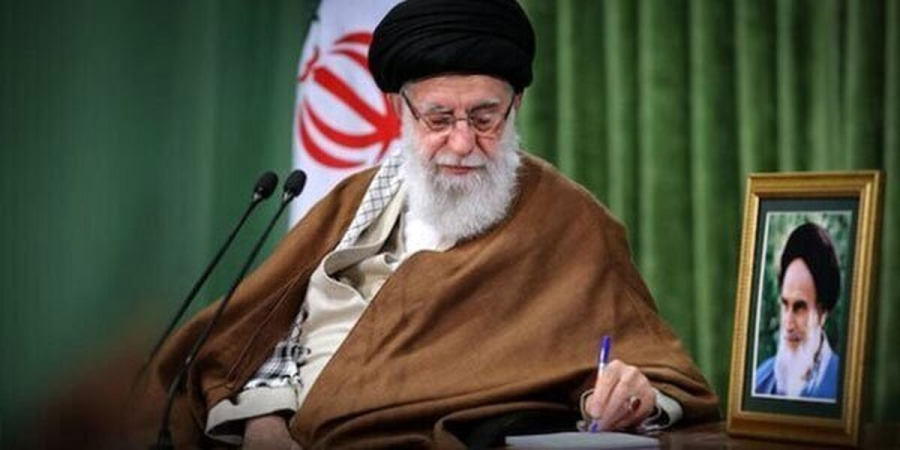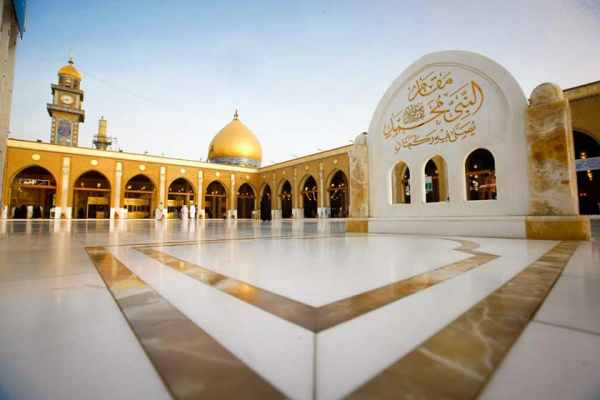The Islamic Republic of Iran is a political system with the form of a republic and Islamic content arising from the Islamic Revolution (1979 February 11) by leadership of Imam Khomeini in Iran, which replaced the monarchy. This political system was formalized in the referendum of April 1, 1979, with the participation of 98.2% of all those eligible to vote, of which more than 97% voted for the Islamic Republic. In this referendum, out of a total of 20,422,438 votes 20, 054, 834 votes were in favor and 367,604 votes were against. With the end of the referendum, at 24:00 on April 1, 1979, in a message, the leader of the revolution called this day the day of God's rule and officially announced the establishment of the Islamic Republic.
The position of Islam in the Islamic Republic
The distinguishing feature of the system of the Islamic Republic of Iran from the common types of the republic in political custom is Islamic nature, meaning that the majority of the Iranian people have chosen Islam and the sovereignty of its scales as the content of the government through a referendum to determine the country's political system.
The principles of Shia Islamic beliefs (monotheism, prophethood, resurrection, justice and imamate) and the principle of dignity and freedom combined with human responsibility are the pillars of the establishment and continuation of the Islamic Republic of Iran.
The sovereignty of Islam and Twelver Shia religion in the system of the Islamic Republic requires that the standards of this religion be dominant and effective in legal, judicial, political and social affairs. Despite this, the rights of the followers of other Islamic schools of thought (Hanafi, Shafi'i, Maliki, Hanbali and Zaidiyya) will be equal to that school and they are free to do actions based on their opinions.
Followers of other divine religions, including Zoroastrians, Kalimians and Christians, who are known as People of the Book, also have these rights: freedom to perform religious ceremonies and teachings according to their religion, creation of religious organizations and Cultural, social and welfare, representation in the Islamic Council, and social, administrative and employment rights. Minorities are not among Divine religions if they do not conspire against Islam and the Islamic Republic, enjoy certain rights as well as good morals and Islamic justice.
Form of government
The form of government in the system of the Islamic Republic is three branches (legislative, executive and judiciary) independent of each other and under the supervision of the leader (supreme leader) and therefore the pattern of separation of powers in it is fundamentally different from the pattern of separation of powers in other systems. It is parliamentary; It is semi-presidential because the people elect the president and it is semi-parliamentary because the president proposes the members of the government to the parliament and the parliament approves them. The comprehensiveness and integrity of the system requires that there be harmony between the three powers, despite the separation of powers. For this purpose, the relations of the three forces and the limits of their independence have been clarified and the principle of banning the collection of jobs has been predicted. In addition to the three forces under the supervision of the leadership, there are special institutions in the implementation of the sovereignty of the Islamic Republic. Institutions such as Islamic Councils, Radio and Television, Supreme National Security Council, Supreme Council of Cultural Revolution, and Expediency Council
The pillars of government
The pillars of the government of the Islamic Republic of Iran are:
Velayat al-Faqih and leadership(supreme leader)
The first pillar of the government of the Islamic Republic is leadership.
According to the preamble of the constitution, the absolute rule of the leadership is the foundation of the Islamic government of the Islamic Republic. The Islamicity of the government means that the current laws in it, in every respect, are based on Islamic standards and the legitimacy of the constitution is conditional on its compliance with Sharia law.
The concept of velayat al-faqih is provided in the constitution (principle 5) in an institutional way. A leader must have these qualities: the scientific qualification necessary for ruling in different chapters of jurisprudence, justice and piety, correct political and social vision, resourcefulness, courage, management, and sufficient power for leadership. .
Powers and duties of leadership
The government forces in the Islamic Republic of Iran operate under the supervision of the leadership (Principle 57) and in fact, the leadership is the highest authority and authority of the government. The important powers and duties assigned to him indicate the importance of this position.
Some of the duties of the leadership are related to maintaining the Islam of the system, such as determining the general policies of the system, monitoring the good implementation of these policies, dismissing and installing and accepting or rejecting the resignation of the jurists of the Guardian Council and the head of the judiciary.
Some of the leadership duties have little to do with the three powers, such as dismissing and accepting the resignation of the commanders and heads of the armed and law enforcement forces or the head of the Broadcasting Organization, because basically having those powers in the hands of one of the powers can be harmful.
Some other duties of the leadership are declaring war and mobilizing forces, issuing a referendum order, and resolving the differences of the three forces and regulating their relations.
In this way, the leadership, while monitoring the government forces, determines their macro policies and solves their problems in performing their duties.
Also, the leader supervises the three forces.
Choosing a leader
The election of the leader is the responsibility of the Assembly of Leadership Experts. They monitor his leadership and his condition and in case of his incapacity, they remove him. In case of removal of the leader or his resignation or death, until the election of a new leader by the Assembly of Leadership Experts, his duties will be entrusted to the temporary leadership council. This council consists of the president, the head of the judiciary and one of the jurists of the Guardian Council.
Legislative branch
The second pillar of the Islamic Republic is the legislature. This authority is based on two distinct pillars: the Islamic Consultative Assembly and the Guardian Council. Each of these elements has duties. The Islamic Council consists of representatives who are elected by direct and secret vote of the people for four years. The main duty of the parliament is to enact laws in all matters and issues within the scope of the constitution. These limits do not conflict with the Sharia standards in the official religion and the constitution, and it is the responsibility of the Guardian Council to recognize them.
The Guardian Council consists of six jurists and six lawyers, whose jurists are appointed by the leader, and whose lawyers are nominated by the head of the judiciary and elected by the votes of parliament members. In addition to examining the conformity of relevant laws with Sharia and the Constitution, this council is also responsible for interpreting the Constitution and supervising elections and referendums.
Executive branch
The third pillar of the Islamic Republic is the executive branch. The president is the highest official position of the country, after the leadership position. The president is elected for four years by direct vote of the people, and his re-election is possible, consecutively, for one term (Principle 114).
The duties and powers of the president include: managing what is considered one of the supreme affairs of the country, such as the implementation of the constitution, the chairmanship and responsibility of the supreme councils of the country (Supreme National Security Council, Supreme Council of Cultural Revolution, Economic Council, Constitutional Revision Council and others) , international affairs (including signing contracts and sending and receiving ambassadors). Chairmanship of the Council of Ministers, supreme chairmanship of affiliated organizations (such as environment, sport and education, atomic energy and management and planning), and awarding government awards. The President, as well as duties and powers related to the legislature (including signing laws, proposing and signing referendums, appointing and dismissing ministers and vote of confidence in the government, suspending elections, attending and summoning the parliament, and requesting the convening of a closed session of the parliament) and Judiciary (appointing the Minister of Justice from among the people proposed by the head of the Judiciary and presenting him to the parliament for a vote of confidence).
The armed forces include the army, with the aim of protecting the independence and territorial integrity of the country; The Islamic Revolutionary Guard Sepah, as a multi-purpose institution (military, law enforcement, political and social) and emerging from the revolution, with the aim of guarding the revolution and its achievements; and police forces, with the aim of establishing order and security, providing public and individual comfort, and guarding the achievements of the Islamic Revolution. The General Command of the country's armed forces is in charge of leadership.
Judicial system
The fourth pillar of the Islamic Republic is the judiciary. This branch is responsible for judicial affairs and the administration of justice, and the authority for dealing with crimes and protecting the rights of individuals and society. At the head of the organization of this branch is the head of the judiciary, who must be a mujtahid. He is appointed by the leadership for five years. The head of the department is responsible for preparing judicial bills and appointing and dismissing judges, and he can delegate some of his powers to the Minister of Justice. The Minister of Justice regulates the relations between the executive, legislative and judicial branches.
Rights and freedoms
In the government of the Islamic Republic of Iran, the principle is equality between people and equality before the law, which includes men and women according to Sharia standards. People's rights and freedoms are divided into two categories: individual and group. The meaning of individual rights and freedoms is the right to property and freedoms related to private life. Private property, which apparently has no specific restrictions, must be provided by legitimate means; otherwise, the government is obliged to return them to their original owners.
The rights and freedoms of private life of people are related to individual choices, interests and tastes. In the Islamic Republic, the freedom to choose a job and place of residence (principle 33) and the freedom of opinions and votes (principle 23) are recognized and protected by the law (principle 22).


















